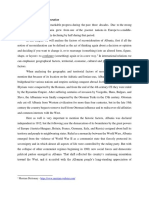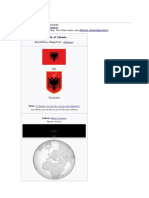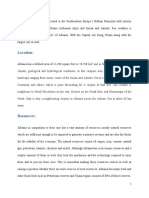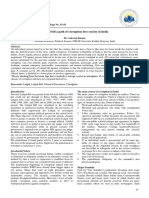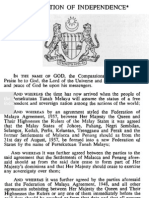Albania (Republic of Albania (: A (W) L - Nee-Ə
Albania (Republic of Albania (: A (W) L - Nee-Ə
Uploaded by
SophiaCopyright:
Available Formats
Albania (Republic of Albania (: A (W) L - Nee-Ə
Albania (Republic of Albania (: A (W) L - Nee-Ə
Uploaded by
SophiaOriginal Description:
Original Title
Copyright
Available Formats
Share this document
Did you find this document useful?
Is this content inappropriate?
Copyright:
Available Formats
Albania (Republic of Albania (: A (W) L - Nee-Ə
Albania (Republic of Albania (: A (W) L - Nee-Ə
Uploaded by
SophiaCopyright:
Available Formats
Albania (/ælˈbeɪniə, ɔːl-/ ( listen) a(w)l-BAY-nee-ə; Albanian: Shqipëri or Shqipëria;
Gheg Albanian: Shqipni or Shqipnia also Shqypni or Shqypnia),[6] officially the
Republic of Albania (Albanian: Republika e Shqipërisë, pronounced [ɾɛpuˈblika ɛ
ʃcipəˈɾiːsə]), is a country in Southeast Europe on the Adriatic and Ionian Sea within
the Mediterranean Sea. It shares land borders with Montenegro to the northwest,
Kosovo[a] to the northeast, North Macedonia to the east, Greece to the south and a
maritime border with Italy to the west.
Geographically, the country displays varied climatic, geological, hydrological and
morphological conditions, defined in an area of 28,748 km2 (11,100 sq mi). It
possesses remarkable diversity with the landscape ranging from the snow-capped
mountains in the Albanian Alps as well as the Korab, Skanderbeg, Pindus and
Ceraunian Mountains to the hot and sunny coasts of the Albanian Adriatic and Ionian
Sea along the Mediterranean Sea.
Historically, the area of Albania was populated by various Illyrian, Thracian and
Ancient Greek tribes as well as several Greek colonies established in the Illyrian
coast. The area was annexed in the 3rd century by Romans and became an integral
part of the Roman provinces of Dalmatia, Macedonia and Illyricum. The autonomous
Principality of Arbër emerged in 1190, established by archon Progon in the Krujë,
within the Byzantine Empire. In the late thirteenth century, Charles of Anjou
conquered Albanian territories from the Byzantines and established the medieval
Kingdom of Albania, which at its maximal extension was extending from Durrës
along the coast to Butrint in the south. In the mid-fifteenth century, it was conquered
by the Ottomans.
The modern nation state of Albania emerged in 1912 following the defeat of the
Ottomans in the Balkan Wars.[7] The modern Kingdom of Albania was invaded by
Italy in 1939, which formed Greater Albania, before becoming a Nazi German
protectorate in 1943.[8] After the defeat of Nazi Germany, a Communist state titled the
People's Socialist Republic of Albania was founded under the leadership of Enver
Hoxha and the Party of Labour. The country experienced widespread social and
political transformations in the communist era, as well as isolation from much of the
international community. In the aftermath of the Revolutions of 1991, the Socialist
Republic was dissolved and the fourth Republic of Albania was established.
Politically, the country is a unitary parliamentary constitutional republic and
developing country with an upper-middle income economy dominated by the tertiary
sector followed by the secondary and primary sector.[9] It went through a process of
transition, following the end of communism in 1990, from a centralized to a market-
based economy.[10][11][12] It also provides universal health care and free primary and
secondary education to its citizens.[5]
The country is a member of the United Nations, World Bank, UNESCO, NATO,
WTO, COE, OSCE and OIC. It is also an official candidate for membership in the
European Union.[13] In addition it is one of the founding members of the Energy
Community, including the Organization of the Black Sea Economic Cooperation and
Union for the Mediterranean.
You might also like
- Historia e ShqiperiseDocument318 pagesHistoria e Shqiperisegertjani100% (2)
- GeographyDocument4 pagesGeographyClaudia Sanchez100% (1)
- In Re Sycip, 92 SCRA 1 (1979)Document3 pagesIn Re Sycip, 92 SCRA 1 (1979)Edgar Joshua Timbang100% (4)
- Albania (Albania (: A (W) L - Nee-ƏDocument1 pageAlbania (Albania (: A (W) L - Nee-ƏOrgito LekaNo ratings yet
- Etymology: A (W) L - Nee-ƏDocument2 pagesEtymology: A (W) L - Nee-ƏAzreen Anis azmiNo ratings yet
- AlbaniaDocument1 pageAlbaniaMilka PlayzNo ratings yet
- AngolaDocument1 pageAngolavirayruelito1No ratings yet
- CountryDocument5 pagesCountryvillarosar43No ratings yet
- AlbaniaDocument1 pageAlbaniaEjidike Chibuisi PromiseNo ratings yet
- Or Shqipnia, Shqypni or Shqypnia Shqipërisë,: Albania (Document1 pageOr Shqipnia, Shqypni or Shqypnia Shqipërisë,: Albania (Rhod Bernaldez EstaNo ratings yet
- Albania Republic of Albania: Përi/shqipëria Shqipni/Shqipnia or Shqypni/Shqypnia Republika e ShqipërisëDocument1 pageAlbania Republic of Albania: Përi/shqipëria Shqipni/Shqipnia or Shqypni/Shqypnia Republika e ShqipërisëȘova AngelicaNo ratings yet
- Factorii de Reconfigurare A AlbanieiDocument3 pagesFactorii de Reconfigurare A AlbanieiNatalita PetreaNo ratings yet
- Albania - Wikipedia PDFDocument62 pagesAlbania - Wikipedia PDFChedly TrimechNo ratings yet
- Albania Is A Country Located in The Southern EuropeDocument4 pagesAlbania Is A Country Located in The Southern EuropeAntonela FrashëriNo ratings yet
- Info AlbaniaDocument42 pagesInfo AlbaniaArim ArimNo ratings yet
- Presentation 1Document6 pagesPresentation 1eugert48No ratings yet
- AnglishtDocument11 pagesAnglishtjunesNo ratings yet
- Concise Timeline of AlbaniaDocument1 pageConcise Timeline of AlbaniaajscarlNo ratings yet
- AlbaniaDocument2 pagesAlbaniakgcpd26d9hNo ratings yet
- Bahan AlbaniaDocument45 pagesBahan AlbaniaAneuk PeakNo ratings yet
- Slovenia (: Sloh - Nee-Ə Republika SlovenijaDocument1 pageSlovenia (: Sloh - Nee-Ə Republika SlovenijaOvidel ShtocNo ratings yet
- Angola (Angola (: PortugueseDocument1 pageAngola (Angola (: PortugueseOvidel ShtocNo ratings yet
- Albania Buyers GuideDocument19 pagesAlbania Buyers GuideAlbania PropertyNo ratings yet
- Tourist Guide Book of AlbaniaDocument162 pagesTourist Guide Book of Albaniamariatsilf1934No ratings yet
- Albanian Cultural ProfileDocument35 pagesAlbanian Cultural ProfileJulian BektashiNo ratings yet
- North Macedonia (Macedonian: of North Macedonia (MacedonianDocument1 pageNorth Macedonia (Macedonian: of North Macedonia (MacedonianJorge ContrerasNo ratings yet
- History of SpainDocument1 pageHistory of Spainurban egoNo ratings yet
- ALBANIA (Shqipëri) : Classroom Country ProfilesDocument2 pagesALBANIA (Shqipëri) : Classroom Country ProfilesJason FranklinNo ratings yet
- SpainDocument2 pagesSpainplayingpiano2100No ratings yet
- History of SpainDocument1 pageHistory of SpainsoepaeNo ratings yet
- Spain (: ListenDocument1 pageSpain (: ListenStelian HudeaNo ratings yet
- SpainDocument1 pageSpainScott MarshallNo ratings yet
- Wonders of Albania : A Journey Through History, Culture, and LandscapesFrom EverandWonders of Albania : A Journey Through History, Culture, and LandscapesNo ratings yet
- Albanian - EngDocument82 pagesAlbanian - EngDreamsAvenue.comNo ratings yet
- Italy (: ListenDocument2 pagesItaly (: ListenAzreen Anis azmiNo ratings yet
- Albania PictureDocument4 pagesAlbania PictureGuernica22No ratings yet
- Albania Formal InformalDocument10 pagesAlbania Formal InformalWaasfaNo ratings yet
- Greater Albania - WikipediaDocument15 pagesGreater Albania - WikipediaKDNo ratings yet
- SerbiaDocument1 pageSerbiamiljkoyuNo ratings yet
- Visitors GuideDocument82 pagesVisitors Guideali1968_roNo ratings yet
- Spain (: ListenDocument2 pagesSpain (: Listenriturai351No ratings yet
- SpainDocument2 pagesSpainSAI CHAITANYA YEPURINo ratings yet
- History of SpainDocument2 pagesHistory of SpainAymanHQNo ratings yet
- Serbia Republic of Serbia: Република Србија Republika SrbijaDocument1 pageSerbia Republic of Serbia: Република Србија Republika SrbijaVojdan StefkovskiNo ratings yet
- Spain (: PeñonesDocument2 pagesSpain (: Peñonesriturai351No ratings yet
- The Calmès ReportDocument40 pagesThe Calmès ReportSette AlessandroNo ratings yet
- MaicopnDocument1 pageMaicopnSC14No ratings yet
- FEFEWFFEFEDocument1 pageFEFEWFFEFESC14No ratings yet
- Angola: Angola, Officially The Republic of Angola (Document1 pageAngola: Angola, Officially The Republic of Angola (Kristine Angela LorqueNo ratings yet
- Angola,: Angola, Officially The Republic of Angola (Document3 pagesAngola,: Angola, Officially The Republic of Angola (Raymund Arizapa AripalNo ratings yet
- 28th NovemberDocument2 pages28th NovemberFisnik MahmutiNo ratings yet
- Republika e Shqipërisë: Republic of AlbaniaDocument4 pagesRepublika e Shqipërisë: Republic of AlbaniaAnna BesaNo ratings yet
- Italiana: Italy (Document2 pagesItaliana: Italy (Jordan MosesNo ratings yet
- North Macedonia: Macedonia and FYROM) - in June 2018, Macedonia and Greece Resolved The Dispute WithDocument1 pageNorth Macedonia: Macedonia and FYROM) - in June 2018, Macedonia and Greece Resolved The Dispute WithOrgito LekaNo ratings yet
- Obopus BG Fiend Vol. 1 (Country Plan Albania) - 0029Document25 pagesObopus BG Fiend Vol. 1 (Country Plan Albania) - 0029Giovanni FalcettaNo ratings yet
- Albania: Jump To Navigation Jump To SearchDocument70 pagesAlbania: Jump To Navigation Jump To SearchSteven HamNo ratings yet
- Myzeqe: LocationDocument5 pagesMyzeqe: LocationJohnston HowarthNo ratings yet
- North Macedonia: Macedonia and FYROM) - in June 2018, Macedonia and Greece Resolved The Dispute WithDocument1 pageNorth Macedonia: Macedonia and FYROM) - in June 2018, Macedonia and Greece Resolved The Dispute WithOrgito LekaNo ratings yet
- De España) ,: Spain (Document1 pageDe España) ,: Spain (Victoria CebanNo ratings yet
- SpainDocument7 pagesSpainArun PayyavoorNo ratings yet
- Grade 3 Geometry Classify TrianglesDocument2 pagesGrade 3 Geometry Classify TrianglesSophiaNo ratings yet
- Los Angeles (: ListenDocument1 pageLos Angeles (: ListenSophiaNo ratings yet
- Won't You Celebrate With MeDocument1 pageWon't You Celebrate With MeSophiaNo ratings yet
- Grade 3 Roman Numerals Write 1 50 FDocument2 pagesGrade 3 Roman Numerals Write 1 50 FSophiaNo ratings yet
- Louisiana (: Listen ListenDocument1 pageLouisiana (: Listen ListenSophiaNo ratings yet
- Grade 3 Roman Numerals Write 1 50 eDocument2 pagesGrade 3 Roman Numerals Write 1 50 eSophiaNo ratings yet
- BostonDocument1 pageBostonSophiaNo ratings yet
- VoltaireDocument1 pageVoltaireSophiaNo ratings yet
- Florida (: ListenDocument2 pagesFlorida (: ListenSophiaNo ratings yet
- Chicago (: Locally AlsoDocument2 pagesChicago (: Locally AlsoSophiaNo ratings yet
- California Is ADocument2 pagesCalifornia Is ASophiaNo ratings yet
- Émile Édouard Charles Antoine ZolaDocument1 pageÉmile Édouard Charles Antoine ZolaSophiaNo ratings yet
- FrançoisDocument1 pageFrançoisSophiaNo ratings yet
- Les Misérables The Hunchback of Notre-Dame Les Contemplations La Légende Des Siècles Cromwell Hernani Notre-Dame de Paris Les MisérablesDocument1 pageLes Misérables The Hunchback of Notre-Dame Les Contemplations La Légende Des Siècles Cromwell Hernani Notre-Dame de Paris Les MisérablesSophiaNo ratings yet
- Honoré de Balzac (: - Zak - La Comédie Humaine Magnum OpusDocument1 pageHonoré de Balzac (: - Zak - La Comédie Humaine Magnum OpusSophiaNo ratings yet
- FrançoisDocument1 pageFrançoisSophiaNo ratings yet
- Charles Pierre BaudelaireDocument1 pageCharles Pierre BaudelaireSophiaNo ratings yet
- G.R. No. 169838 Case DigestDocument4 pagesG.R. No. 169838 Case DigestCee Gee Doltz BacudNo ratings yet
- Leyéndose Lifestyle Sports y SurfDocument248 pagesLeyéndose Lifestyle Sports y SurfHansy ZapataNo ratings yet
- !court: L/epublic of TbeDocument34 pages!court: L/epublic of TbeChristopher Martin GunsatNo ratings yet
- Tugas 2 Adbi4201 Bahasa Inggris NiagaDocument2 pagesTugas 2 Adbi4201 Bahasa Inggris Niagaimannur083No ratings yet
- Civil ServiceDocument15 pagesCivil ServiceMary HiboNo ratings yet
- Chapter-5-Group-6 20231205 090953 0000Document19 pagesChapter-5-Group-6 20231205 090953 0000PEACE- Kia Jane AponestoNo ratings yet
- WFP Philippines Country Brief 2023Document2 pagesWFP Philippines Country Brief 2023GRey AgadNo ratings yet
- PP vs. Hon. PimentelDocument2 pagesPP vs. Hon. PimentelRiva Mae CometaNo ratings yet
- PNB Vs PIKEDocument2 pagesPNB Vs PIKETAU MU OFFICIALNo ratings yet
- Public Enterprises:: Issues and Challenges With The Philippines' Public Corporate SectorDocument12 pagesPublic Enterprises:: Issues and Challenges With The Philippines' Public Corporate SectorRomel Torres100% (7)
- Beneficial ConstructionDocument24 pagesBeneficial ConstructionAbhishekKuleshNo ratings yet
- Legal Services at VA Facilities 6-14-13 (Short)Document3 pagesLegal Services at VA Facilities 6-14-13 (Short)JimNo ratings yet
- Lokpal Bill A Path of Corruption Free Society in IndiaDocument4 pagesLokpal Bill A Path of Corruption Free Society in IndiaSharma Shikha100% (1)
- Laws, Policies & Programs For Philippine WomenDocument38 pagesLaws, Policies & Programs For Philippine WomenAngel Marie Rule100% (1)
- Pa Basic DoctrineDocument6 pagesPa Basic DoctrineTheresa MendozaNo ratings yet
- Labor ArbiterDocument4 pagesLabor Arbiterpatricia.aniyaNo ratings yet
- Anexa 3 Criterii de Evaluare Si Selectie 3.1-3.3wefDocument17 pagesAnexa 3 Criterii de Evaluare Si Selectie 3.1-3.3wefAlina IancuNo ratings yet
- Last Years of Weimar Republic 1929-33Document2 pagesLast Years of Weimar Republic 1929-33Felipe AlvesNo ratings yet
- D'Haen European LiteratureDocument6 pagesD'Haen European LiteraturevladimirNo ratings yet
- Paper 2 - Joan Kelly - InglêsDocument6 pagesPaper 2 - Joan Kelly - InglêsRobson CostaNo ratings yet
- Request For MC 25th Natcon 2023Document7 pagesRequest For MC 25th Natcon 2023robertoNo ratings yet
- Lepanto Consolidated Mining vs. DumyungDocument4 pagesLepanto Consolidated Mining vs. DumyungMark Genesis Alvarez RojasNo ratings yet
- People vs. Lacerna (1997)Document4 pagesPeople vs. Lacerna (1997)Katrina Calugay100% (3)
- R.A. 9262 - VawcDocument8 pagesR.A. 9262 - VawcMiakaNo ratings yet
- School of Law,: IV Year 7 Lesson PlanDocument3 pagesSchool of Law,: IV Year 7 Lesson Plankajkargroup100% (1)
- TR-EU Relations - Final Task - Onurhan ÖZTÜRKDocument4 pagesTR-EU Relations - Final Task - Onurhan ÖZTÜRKOnurhan ÖztürkNo ratings yet
- Land Reclassification Per SecDocument2 pagesLand Reclassification Per SecAnonymous 6Xoh1YWIDeNo ratings yet
- Proclamation of Independence - 1957Document2 pagesProclamation of Independence - 1957Walski of SoundNo ratings yet
- Collective Memory and HistoryDocument56 pagesCollective Memory and HistoryAssmaa HassanNo ratings yet











